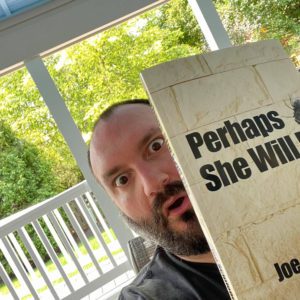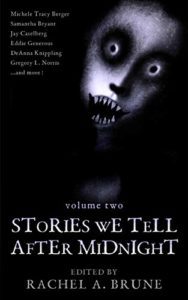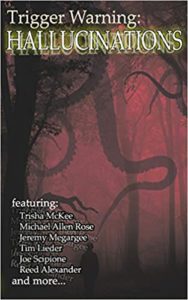 Joe Scipione lives in the suburbs of Chicago with his wife and two kids. He is a member of the Horror Writers Association and a Senior Contributor and horror book reviewer at Horrorbound.net. He is the author of Perhaps She Will Die and the 2022 releases Zoo and Decay. He has had stories published in several anthologies including Stories We Tell After Midnight: Volume 2, Good Southern Witches, and Trigger Warning: Hallucinations. When he’s not reading or writing you can usually find him cheering on one of the Boston sports teams or walking around the lakes near his home. Find him on Twitter: @joescipione0 or at www.joescipione.com
Joe Scipione lives in the suburbs of Chicago with his wife and two kids. He is a member of the Horror Writers Association and a Senior Contributor and horror book reviewer at Horrorbound.net. He is the author of Perhaps She Will Die and the 2022 releases Zoo and Decay. He has had stories published in several anthologies including Stories We Tell After Midnight: Volume 2, Good Southern Witches, and Trigger Warning: Hallucinations. When he’s not reading or writing you can usually find him cheering on one of the Boston sports teams or walking around the lakes near his home. Find him on Twitter: @joescipione0 or at www.joescipione.com
What first attracted you to horror writing?
I guess this is a two-part question for me. When I was younger, I was always a fan of reading horror. Especially John Bellairs when I was in elementary school. I read everything he wrote and can remember lying in bed at night reading and getting so pulled into the story that I never wanted to go to sleep. After Bellairs, I moved on to Stephen King (and some others, but mostly just King) and he had the same effect on me. When I started writing, everything always leaned toward the dark stuff.
I was a history major in college. I took a class—I don’t remember what class it was now—but we wrote a historical fiction story for the final exam. The story had to discuss everything we’d covered in class that semester. I loved writing the story and even then, my paper took a dark turn. I’ve been writing and submitting pretty much every year since then.
My wife always tells me to try writing something else, like a romantic Nicholas Sparks book or something like that. I always tell her I can write the romance, but I’m sure somewhere along the line things would end up taking a dark or paranormal twist.
 What is your most notable work?
What is your most notable work?
Currently I have one book out, my debut novel Perhaps She Will Die, it’s a story about the Ewing family that moves into a new neighborhood that they think is perfect. They aren’t aware of a series of disappearances that have taken place on the area over the last hundred years. Lisa Ewing is home during the day while her kids are at school and her husband at work. She investigates the disappearances, gets too involved and discovers the dark secret about the disappearances that even the police never uncovered. I also have a about ten stories published in various anthologies.
I realize this sounds like a cliché answer, but I think my next book is my most notable work. A person will always improve anything they do if they keep working at it. I wrote Perhaps She Will Die four years ago and even though the reviews have been positive, I know if I went back to read it now, I’d see so much that I’d want to change in there, because I’ve learned so much since then. What I’m writing now will probably not be as good as something I write ten years from now.
When I sit down to write something, I want to write the best thing I can in that moment. I know I’m going to continue writing and improving with each word. When I decided to get more serious about writing I told myself that I didn’t have to write words every single day, as long as I was getting better every day. So, I started reading more books about the craft of writing, I started reading books in other genres, and I started analyzing the way other writers tell stories so I could make myself better. It’s become something I don’t even think about anymore when I watch a movie or TV show or when I read a book, my mind automatically examines and analyzes the way the author tells the story.
I guess that’s just the long way of saying whatever I’m working on next is my “most notable” work.
What are you working on now?
I have a story collection titled Zoo coming out in April from D&T Publishing, so I’m working on a few final details for that. I have a Civil War Era novella titled Decay coming out in November as well. As for new writing, I’m in the middle of a novel right now. This is one of those ideas that has been sitting in my head for a long time. It’s a cosmic horror novel about a homeless man living in Chicago. While it’s cosmic horror, it’s as much about the horror of being homeless in a big city like Chicago as it is about those otherworldly terrors. I had the idea of the story for a long time, but never wrote it because I was missing the protagonist and the setting and I wanted to make sure I had a character and setting that matched the vibe I was going for in the story. I watched a documentary on homelessness and I realized the character for this story had to be homeless. He’s been through so much in his life to bring him to this point that nothing surprises him anymore. I did a lot of research for this book and I really hope to find a home for it once it’s done because it shines a light on a part of society that people often turn away from and try not to face.
 I also have a few ideas that I’m constantly thinking about so that I can move into the next project when this one is done. One idea that has been eating away at me a lot lately is actually not a fiction book. It’s a non-fiction idea that I just can’t shake. I went to college for History and I have a Master’s in Teaching History so history has always been a big part of my life. It would take a lot of research and work on my part but it’s something that I definitely want to write in the future. It’s book about the use and inclusion of disabilities in horror literature throughout history. My kids have physical disabilities and mental health issues so the topic is obviously very personal for me. I was a special education teacher for a few years and it’s a topic a know quite a bit about. When I first got the idea, I started to look around to see what had already been written on the topic and saw that there wasn’t anything that went deep into the topic of disability within the history of horror literature. I know I’ll get around to writing it one day. It’s one of those things that I think I’ll write no matter what—even if I never find a publisher for something like that, it’s important for me to put the work in on that and see what comes of it. When I’m not working on fiction stuff, that book idea has really been on my mind quite a bit lately.
I also have a few ideas that I’m constantly thinking about so that I can move into the next project when this one is done. One idea that has been eating away at me a lot lately is actually not a fiction book. It’s a non-fiction idea that I just can’t shake. I went to college for History and I have a Master’s in Teaching History so history has always been a big part of my life. It would take a lot of research and work on my part but it’s something that I definitely want to write in the future. It’s book about the use and inclusion of disabilities in horror literature throughout history. My kids have physical disabilities and mental health issues so the topic is obviously very personal for me. I was a special education teacher for a few years and it’s a topic a know quite a bit about. When I first got the idea, I started to look around to see what had already been written on the topic and saw that there wasn’t anything that went deep into the topic of disability within the history of horror literature. I know I’ll get around to writing it one day. It’s one of those things that I think I’ll write no matter what—even if I never find a publisher for something like that, it’s important for me to put the work in on that and see what comes of it. When I’m not working on fiction stuff, that book idea has really been on my mind quite a bit lately.
What is your writing routine?
My daily routine is probably a lot different than most writers. I have time during the day when I write, but it’s not consistent and it’s not every day. However, my daughter has cerebral palsy and is on a feeding tube. Because of this, someone has to be with her at night when she has her dinnertime feeding. We do this in her bedroom because she’s usually tired by the end of it and ready for bed. It takes about an hour and a half for her to have her feeding and so while I’m giving her the feeding, I have my laptop with me and I’m typing away most of the time while she is in her room using her iPad. This is when I get the majority of my writing done. (Including writing the answers to these questions.)
As far as my routine for writing a novel or a story, I like to write and then immediately go right into editing. I keep mental notes and notes within the document I’m working on of what I want to fix or change. I like to go through and make those big changes right away. I usually go through and edit something two times before I put it away for a while. Sometimes it’s a month or two, sometimes it’s even longer than that. Then when I come back to it I know the big changes I wanted to make when I was writing it are all in there and I can start looking more at wording and sentences and stuff like that instead of the overall story. The editing process was the hardest for me to figure out. I used to think that once I had a story written, the hard part was done. Then I could just go through the document, fix the typos and call it finished. Now, I spend a lot more time of editing than I do on writing the thing and I think you can tell when you look at the finished product.
 Who do you admire in the horror world?
Who do you admire in the horror world?
There are so many people I admire in the horror world. There are so many writers—past and present—who have influenced me and continue to influence me. I read a ton and as I said before I am always looking at the way different writers tell a certain story. If you gave the same first sentence to a hundred writers and asked them to write a story, you’d get a hundred different stories. It just shows that every writer is unique and you can learn so much by reading. I try to read a variety of different authors and genres. I read diversely because writers from different backgrounds are going to tell a much different story that the ones I tell. Hearing their stories will make me not only a better writer, but also a better person. I admire indie writers too because I know the work that goes into writing a book. It is long, hard work day after day. And there is so such self-doubt. To be able to push past all of that and publish something that people like to read—whether through a traditional publisher or self-published—is something to be admired.
The same goes for indie and smaller publishers. They aren’t in this business to make a fortune, just like the writers. They are publishing books and anthologies because they love the stories and horror. The work is hard on that end of it too and the people who run the small presses that publish horror put out some great work. Although I think it would be great to get the chance to edit an anthology one of these days, I can only imagine how hard it is to read 200 or 300 stories knowing you’re going to have to reject most of them just based on the fact that you only have so many stories you can accept. I get the feeling sending out rejections is just as hard on editors as it is on writers.
I’ve been reviewing horror books at HorrorBound.net for a few years now and we have a great team over there. Charlotte does a great job of running the site and keeping the reviews positive. Because of that I have a lot of respect for reviewers too. I think some writers think reviewers are looking for reasons not to like their books. But, at least in my experience, that is not the case. The books I’ve reviewed and the reviewers I have spoken to over the years—it’s always about looking for reasons to write a good review. No one wants to write a negative review.
Do you prefer all out gore or psychological chills?
It depends a lot on my mood, but I like them both. I pick my next book to read based a lot on how I’m feeling. There are times when I want something quick and easy that doesn’t require much thinking. Other times I want to read something that challenges me and makes me think long after I’ve put the book down.
There is certainly a place in horror for all kinds of writers and all kinds of books which I think is why we see so many different sub-genres popping up. Horror is so diverse that there is room for everything. Sometimes you’re in the mood for a Richard Laymon or Wrath James White book, other times you want to read Thomas Ligotti or Shirley Jackson. All four of those writers are great but they write very different types of stories yet they are all considered horror. I think it’s great to be able to get such a wide array of stories within a single genre.
Why should people read your work?
I think people should read my work—or any authors work—because they want to see something from that person’s perspective. Even though what I write is fiction, the act of writing is deeply personal and I think you can see a lot of the author when you read their work. Its not the gory stuff or the scary stuff that shows you who the author is, it’s the other stuff. The relationships they portray in their writing and their characters.
I like to think I bring a unique voice to the genre because my experiences are different than most.
Recommend a book.
It’s impossible for me to recommend just one book so I’ll recommend three but for different reasons.
The first is The Scar by China Mieville. This book is probably more fantasy than horror, but it has vampires in it and quite a lot of body horror. The reason I like this book—and all of Mieville’s work in general—is that it reminds me that nothing is out of the realm of possibility when I write something. If you can think of it, you can write about it and Mieville thinks of some wild shit in this one and I love it. I’ve read it four times.
The second book is The Haunting of Hill House by Shirley Jackson. This is another one of those books that I go back to over and over, but for different reasons than The Scar. With this book it’s all about character for me and about the way Jackson can make the house seem scary without putting every detail in the book, yet she can still get the point across.
A final book is The Hellbound Heart by Clive Barker. It’s a short read, but there is so much story packed into it. Again, for me this book is about character development, and—unlike Jackson—Barker puts all of the detail and gore in there and it’s great.
I guess my three book recommendations display quite well what I was talking about earlier regarding horror having many different faces and sub-genres while still being labeled horror.
BOB PASTORELLA









